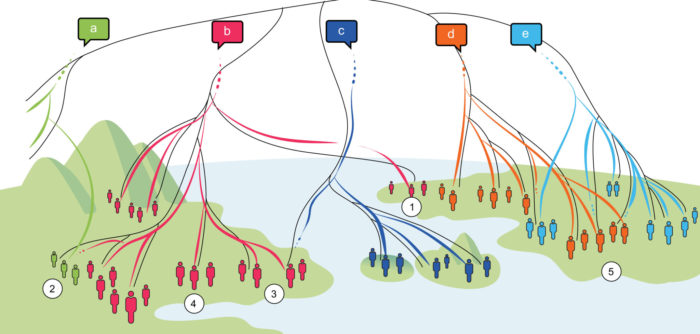Oct 30 2023
Finding Common Ground on Democracy
 How is American democracy doing, and what can we do to improve it, if necessary? This is clearly a question of political science, and I am not a political scientist, and this is not a political blog. But there are some basic principles of critical thinking that might apply, and the second word in “political science” is “science”. Further, while this is not a political blog, what that really means is that I endeavor to be non-partisan. I am not trying to advocate for any particular party or ideological group. But many of the issues I discuss have a political dimension, because most issues do. Global warming is a scientific question, but there are massive political consequences, for example.
How is American democracy doing, and what can we do to improve it, if necessary? This is clearly a question of political science, and I am not a political scientist, and this is not a political blog. But there are some basic principles of critical thinking that might apply, and the second word in “political science” is “science”. Further, while this is not a political blog, what that really means is that I endeavor to be non-partisan. I am not trying to advocate for any particular party or ideological group. But many of the issues I discuss have a political dimension, because most issues do. Global warming is a scientific question, but there are massive political consequences, for example.
So if you will indulge me, I want to apply some basic critical thinking principles to some pressing questions regarding our democracy. My goal is to see if we can find some common ground. This is something I frequently recommend in many contexts – if you are trying to convince someone that a particular belief of theirs is pseudoscience, a good place to start is to establish some common ground and then proceed from there. Otherwise you will likely be talking past each other.
Also, despite the fact that we seem to be having increasing partisan division in this country, my sense is that we still have much more common ground than may be apparent. The media and politicians both benefit from emphasizing division, conflict, and differences. Keeping everyone as outraged and agitated as possible maximizes clicks and votes. Both polling and personal experience, if you look beyond the surface level, also tell a story of common ground. Most common-sense positions are supported by large majorities. Most people want basically the same things – safety, prosperity, liberty, transparency and fairness. This is not to minimize the very real different value judgements that exist in society. This is why we need democracy to work out compromises.

 What does a majestic eagle sound like, or the hoot of a spider monkey, or the roar of a bear?
What does a majestic eagle sound like, or the hoot of a spider monkey, or the roar of a bear?  I’ve been following AI (artificial intelligence) news very closely, including all the controversies and concerns. I tend to fall on the side of – AI is a powerful tool, we should continue to develop it and use it responsibly. We don’t need to panic, and highly restrictive laws are likely unnecessary and counterproductive. But there are legitimate concerns about the power of AI, especially in the “wrong” hands. I also think the greatest disruption to our lives might not come from cyberterrorists (although a legit concern) or AI run amok, but from marketing. Giving companies who see us only as customers the power to predict our every move gives me pause.
I’ve been following AI (artificial intelligence) news very closely, including all the controversies and concerns. I tend to fall on the side of – AI is a powerful tool, we should continue to develop it and use it responsibly. We don’t need to panic, and highly restrictive laws are likely unnecessary and counterproductive. But there are legitimate concerns about the power of AI, especially in the “wrong” hands. I also think the greatest disruption to our lives might not come from cyberterrorists (although a legit concern) or AI run amok, but from marketing. Giving companies who see us only as customers the power to predict our every move gives me pause. On the current episode of the SGU, because it is pride month, we expressed our general support for the LGBTQ community. I also opined about how important it is to respect individual liberty, the freedom to simply live your authentic life as you choose, and how ironic it is that often the people screaming the loudest about liberty seem the most willing to take it away from others. That was it – we didn’t get into any specific issues. And yet this discussion provoked several responses, filled with strawman accusations about things we never said, and weighed down with a typical list of tropes and canards. It would take many articles to address them all, so I will focus on just one here. One e-mailer claimed: “It is obvious to me that the 98% of trans people have a mental illness that should be treated like any other mental illnesses.”
On the current episode of the SGU, because it is pride month, we expressed our general support for the LGBTQ community. I also opined about how important it is to respect individual liberty, the freedom to simply live your authentic life as you choose, and how ironic it is that often the people screaming the loudest about liberty seem the most willing to take it away from others. That was it – we didn’t get into any specific issues. And yet this discussion provoked several responses, filled with strawman accusations about things we never said, and weighed down with a typical list of tropes and canards. It would take many articles to address them all, so I will focus on just one here. One e-mailer claimed: “It is obvious to me that the 98% of trans people have a mental illness that should be treated like any other mental illnesses.” I first wrote about the
I first wrote about the  There are a couple of recent stories that remind me that perhaps the most powerful thing in the world is political will. Often politicians and motivational speakers will say something along the lines of, “We can do anything, if we put our minds to it.” While this sounds like feel-good pablum, I think there is some truth to it (with a bunch of caveats regarding “anything”). We (collectively) have a great deal of ingenuity, technological savvy, institutions and methods of change, and resources. What we often lack is collective will.
There are a couple of recent stories that remind me that perhaps the most powerful thing in the world is political will. Often politicians and motivational speakers will say something along the lines of, “We can do anything, if we put our minds to it.” While this sounds like feel-good pablum, I think there is some truth to it (with a bunch of caveats regarding “anything”). We (collectively) have a great deal of ingenuity, technological savvy, institutions and methods of change, and resources. What we often lack is collective will. After publishing thousands of blog posts I have found that sometimes the most trivial topics garner the most debate, both in amount and intensity. I wouldn’t call it a rule, just a casual observation, likely rife with confirmation bias. But at the very least I am surprised sometimes by how vehemently people will argue about points that are ultimately subjective and of little importance.
After publishing thousands of blog posts I have found that sometimes the most trivial topics garner the most debate, both in amount and intensity. I wouldn’t call it a rule, just a casual observation, likely rife with confirmation bias. But at the very least I am surprised sometimes by how vehemently people will argue about points that are ultimately subjective and of little importance. There are now approximately 8 billion people on the planet. In addition, there are over
There are now approximately 8 billion people on the planet. In addition, there are over 




